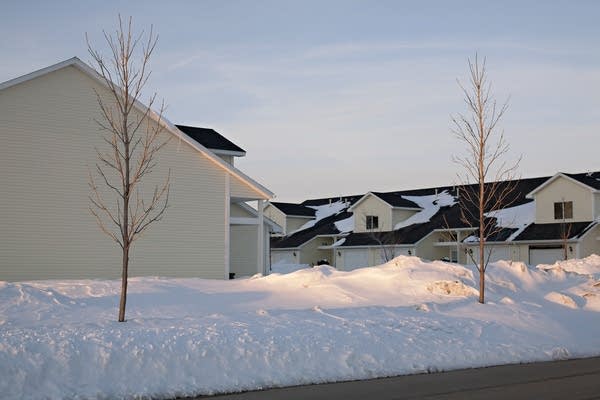Millions approved for affordable housing across Minn.

From Warroad to Worthington, small towns across Minnesota are struggling to add housing as fast as businesses add new jobs.
In Thief River Falls, the lack of housing is stifling job growth for two of the city's largest companies, Digi Key and Arctic Cat. Together they could hire 225 workers "today if they could find housing for them," said Thief River Falls Mayor Jim Dagg.
In Roseau, snowmobile/ATV manufacturer Polaris could hire 200 new employees in his city, but there's no housing, said Mayor Jeff Pelowski. Roseau owns a 24 unit complex and like everything else in town, he said, it's full.
Money approved Thursday by the Minnesota Housing Finance Agency will help, though city leaders say it won't come close to meeting all the needs.
Create a More Connected Minnesota
MPR News is your trusted resource for the news you need. With your support, MPR News brings accessible, courageous journalism and authentic conversation to everyone - free of paywalls and barriers. Your gift makes a difference.
The agency backed $54 million for affordable housing projects across the state, with the money addressing housing needs from homelessness to low-income workers. Minnesota Housing Finance Agency Commissioner Mary Tingerthal said she hopes the state investment can provide the nudge developers need to move ahead on projects.
"It's a little bit of pump priming," she said of the money. "It's a little bit of 'OK, if we all kinda jump in the pool together, we'll all be safe here.' "
A SLOW APPROACH
Housing development isn't moving fast enough in part because developers are conservative and want to know the housing demand will still be there 30 years from now, officials said. Gov. Mark Dayton's Housing and Job Growth Initiative set aside $10 million to help rapidly growing communities. Half of the money will be allocated for projects this year. The remaining $5 million will go for projects in growth communities next year.
Two projects approved Thursday by the housing finance board will create 50 new apartment units in Thief River Falls. That's good news, Dagg said, but the city could fill three times that many. Building 150 new apartments would allow the city to catch its breath, and give local companies confidence to keep growing, he added.
"Right now they've got some that are working overtime a lot to help offset some of those employment needs," Dagg said. "They can only do that so long. So, it's all good but nothing seems to move fast enough."
Housing Finance Agency funds will help build 40 apartment units in Roseau. That's a positive, but won't solve the town's growing problem, Pelowski said.
He worries the housing shortage will force Polaris to expand elsewhere.
"They're expanding in Poland right now," he said. "We'd love to see them grow here as well. But you know they're going to go where it makes sense business wise." To stay in the mix, Roseau needs to be competitive, he added.
PLANNING IS KEY
That's a challenge Housing Finance Agency Commissioner Tingerthal says the agency is focused on. It's not just money she says, but planning for smart growth in high-demand communities.
Roseau and Thief River Falls highlight the housing shortage in northwest Minnesota. In southwest Minnesota, another tight housing region, the agency has held meetings in Worthington and Mankato; leaders plan to travel across the state to talk about ways to keep job-rich towns growing.
The state targeted money to rapidly growing towns in the 1990s, but when recession hit the need for that program dried up, said Tingerthal.
Federal law dictates where some housing money must be spent. The rest is allocated based on Housing Finance Agency priorities. Demand far exceeds available funds. This year the agency received proposals for more than $170 million but approved only $54 million. About two-thirds of the money goes to projects in the Twin Cities metro area and one-third to communities elsewhere in the state.
In some ways, the shortage is a good problem to have, Tingerthal added, because it means "our home grown manufacturing companies are producing jobs and a need for housing."
